From Vertical Scroll to Screen: Anime Adaptations of K-Comics
by Rebecca Silverman,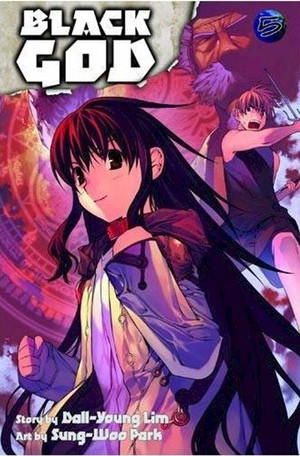
It's becoming hard to miss: anime is increasingly mining Korean comics for inspiration. It's hardly a new thing, though – back in 2004, Ragnarok started the ball rolling, followed by Black God in 2009. The former series was based on a game, while the latter adapted a manga, with both comic and anime being Japan/South Korea co-productions. The more recent trend is to take Korean manhwa and simply adapt it into anime form, occasionally while creating a little doubt about the source materials' origins by using the Japanese readings of characters' names, as we see in Viral Hit, Why Raeliana Ended Up at the Duke's Mansion and Doctor Elise: The Royal Lady With the Lamp. In the latter two, it works a little better since barely any minutes are devoted to Raeliana and Elise in their modern world guises; Viral Hit feels much less honest about it, given the modern Korean setting. But still, it's a nice breath of fresh air to see these adaptations because even if some of the story beats are familiar, the way they're handled can be just different enough to make them feel new again.
Black God and Ragnarok aside, most of these adaptations have occurred within the last four years, with Noblesse, The Tower of God, and The God of High School all airing in 2020, Raeliana and the first season of A Returner's Magic Should Be Special airing in 2023, and 2024 bringing us Doctor Elise, Solo Leveling, and Viral Hit. The balance is overwhelmingly sonyeon, which is the Korean equivalent of shōnen, with only Raeliana and Doctor Elise falling under the sonyeo, or shōjo, category. (I'm trying not to throw too many new words at you; yes, there are Korean equivalents to seinen and josei as well, which might better fit a few of these series.) The current True Beauty adaptation will help even those numbers out a bit. It's worth mentioning that Japan isn't the only country adapting manhwa into animated form; the Chinese animated series for Lookism is available on Netflix as of this writing, and it's not too hard to find the Korean animated adaptation of When I Woke Up I Became a Bagel Girl either.
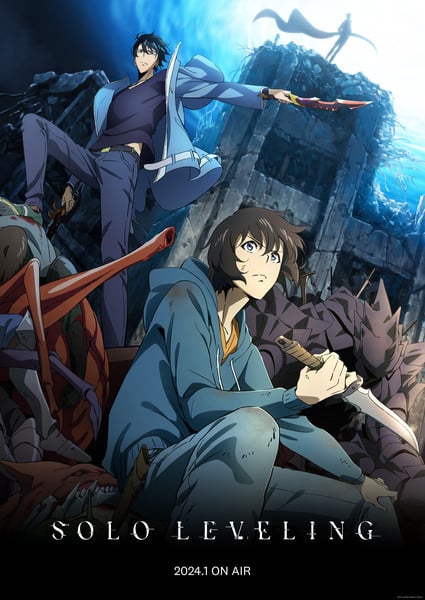
Interestingly enough, both sonyeo titles began as novels. However, neither has been officially translated into English, which is also true for A Returner's Magic Should Be Special's original source. That means that Solo Leveling is unique among the series in that all three of its main forms have been made available in English translation: the original novels are published by Yen Press, the K-Comic by their Ize imprint, and the anime streams on Crunchyroll.
It perhaps shouldn't be surprising that this is the series with the best press. It's the most familiar in the modern anime landscape in terms of what tropes and beats it employs, and it wraps them up in an appealing underdog narrative. Taking place in a version of our world where dungeons suddenly began appearing, and people consequently gained RPG-like adventurer powers, it follows Jinwoo Sung, a down-on-his-luck young man who is trying desperately to raise his younger sister and support both her and their hospitalized mother. He ends up becoming an adventurer because he doesn't see that he has many other options, even though his level is low and his abilities are limited.
All of that changes one horrible experience later: the dungeon he's trying to close with a large group has a hidden boss chamber that decimates the group, including Jinwoo. When he's on the verge of death, he's suddenly given the bizarre option to “become a player,” and when he accepts it, the world turns into almost a literal game for him. Essentially, he becomes the only one who knows the world for the death game it is, and with his new abilities, he's better able to do the things he wants, even as it also brings some very unwanted side effects. The whole thing puts Jinwoo in the shoes of characters like Kirito and Hajime Nagumo, a superhuman player in a world of faceless mobs…or it would if there weren't international tensions underlying the plot. South Korea's not the only place to have a dungeon problem, and as the story goes on, Jinwoo finds himself faced with adventurers from other countries, and in the original novels, there are some definite allusions to the historically strained relationship between Japan and South Korea. That does give it a bit of an edge, although it's perhaps not the series to check out if you're looking to see how K-Comic storytelling differs from manga.
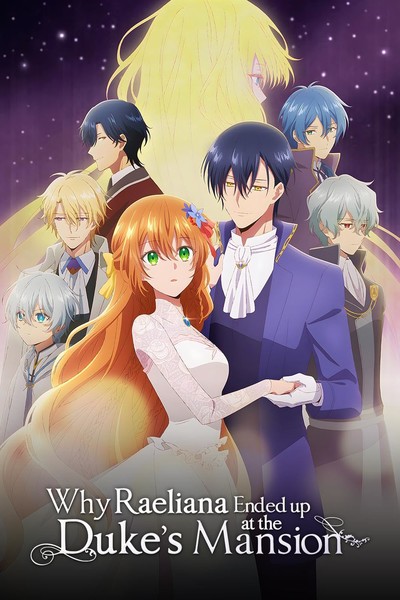
If that's what you're after but still want a little of the familiar, I'd suggest checking out The Reason Why Raeliana Ended Up at the Duke's Mansion. Although the original novel isn't (legally) available, the K-Comic is, courtesy of Yen Press, and the story is a good one.
It follows Eunha Park (Rinko Hanasaki) after she's pushed off a building in our world and wakes up in another one – in the body of Raeliana Macmillan. Raeliana is a side character in a novel Eunha read, and the novel's plot can't kick off without her death. Raeliana has no desire to die (again), so she sets out to make a deal with the romantic lead, Noah. She figures that she'll prevent her death and then slip aside so that Beatrice, the real heroine, can step in…except that Beatrice is nowhere to be found and Noah is becoming very attached to her.
Unlike most reincarnation stories in the manga, Eunha/Raeliana isn't a villainess or a heroine; she's just a regular young woman trying not to die. The unfolding plot plays with ideas of fiction versus reality as Raeliana starts to realize that the assumptions she's making are based on a book, which isn't necessarily going to mimic real life because people aren't characters and have their own free will. That includes Beatrice, and as the story goes on, it starts to look like whoever wrote the book did a lot of reworking of her character, because she is definitely not the woman Raeliana remembers. The anime unfortunately ends just before the manhwa starts to unveil its answers, which is a shame, but at least we can read its continuation.
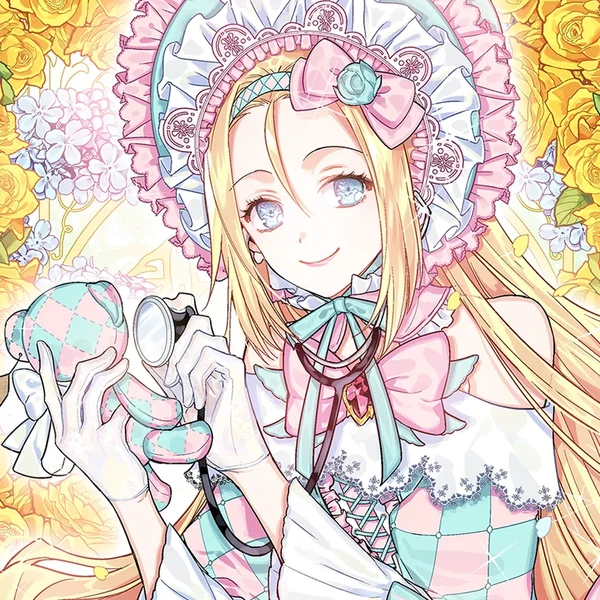
That's a similar issue that Doctor Elise suffers from. The anime adaptation ends long before any plot threads are tied up, which can make for some frustration. However, the K-Comic is legally available in English on Tapas and Lehzin. On the plus side, the entire thing is there, but the tradeoff is that you must pay by chapter and read it on a screen, something I'm hoping will change at some point.
The major tragedy of this series' short run is that we barely get to know Elise's story because what we get follows a much more traditional reincarnation plotline. The life we're following is Elise's third: in her first incarnation, she was Elise de Clarence (Clorence in the anime subtitles, presumably to rhyme with Florence [Nightingale]), the spoiled daughter of a noble whose selfishness made it very easy to blame her for the kingdom of Britia's problems when she became queen.
After her death, she was born in modern Korea as Ji-hyeon Song (Aoi Takamoto) and worked hard to become the best surgeon in the country. After dying in a plane crash, she wakes up to find that she's Elise again, but with Ji-hyeon's knowledge, she determines that she will bypass the whole queen business to become a doctor once more. But Britia isn't in the habit of allowing women to practice medicine as physicians (nurses are slightly more acceptable).
Elise's first battle is to get rid of her engagement to the prince and gain entry to medical school. Although the anime doesn't always show it, it's an empowering story, one that, in the manhwa, showcases Elise's determination and grit. Does she have some “smartest person in the room” issues? Yes, but she's also much smarter than many a reborn villainess; think of her as Mia Luna Tearmoon with brains. As you can see, it doesn't alter the familiar formulas very much, but it still feels different enough. However, if I'm being perfectly honest, I'd read the K-Comic rather than watch the anime if you're only going to do one.
That's a recommendation I'd make for Noblesse as well. Comprising twenty-five collected volumes, this is another series that an ONA and a TV series can't do justice to. You can read it on Line Webtoon, but it's also being released physically by Wattpad's webtoon publishing branch, so unlike Doctor Elise, you have options. Plenty of animation studios have attempted to adapt this vampire saga – in 2015, it had a domestic OVA (Noblesse: Beginning of Destruction), then in 2016, it had the ONA Noblesse: Awakening, animated by Production I.G.. The TV series didn't follow until 2020, and it picks up right where the ONA left off, with volume two of the manhwa. Needless to say, that's a bit of a barrier for some viewers, who either had forgotten the ONA or didn't want to watch it to understand the new series.
Admittedly, Noblesse doesn't start as the most coherent story anyway; it follows vampire Rai as he wakes up after an 820-year nap and has to figure out the modern world. He ends up enrolling in high school, as one does, and befriends a group of kids who then help him in his attempts to recover his memories while fighting off a shady organization. It's pure pulp, reveling in ludicrous plots, insane fights, and all the other things that make the genre so much fun. Its biggest barrier to entry is the relatively slow start, and it's not hard to see why the TV series decided to just jump in at volume two and hope people would go back to the ONA.
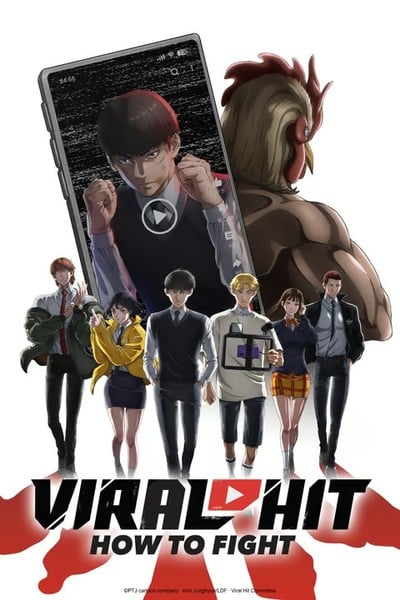
Where to start and stop an adaptation is a tricky question to answer. From what I understand, Viral Hit is another series that may suffer from a rough story start, choosing to open with the beginning of the manhwa despite its brutality being something of a dealbreaker for some people.
The title is a pun on what's disconcerting about the story's start – high school student Hobin (Kota) is viciously bullied at school, and videos of him being pummeled to a pulp are used by his bullies to gain YouTube-equivalent views, meaning that each physical hit that goes viral is, in fact, a “viral hit.” Since, in the story's world, viral videos are monetized, this means that his bullies are profiting off of Hobin's pain in a very real way, and he has had enough.
When one of the bullies accidentally livestreams a fight with Hobin at Hobin's house, our hero takes the first step from being a victim to a survivor, realizing that if he can take the power away from his bullies, he can solve his financial issues and get some sweet revenge in one fell swoop.
The story becomes about taking back your power and making good, and on that thematic front, it's hard to argue with it. But the sheer brutality of the anime version's first episode is stomach-churning, especially if you're a survivor of harsh bullying yourself. While I can't say with certainty that it might have been better to start in the middle of the story and then flashback once we know Hobin will be all right (because that storytelling method has its pitfalls), this risks losing its audience before it even gets started. Luckily, the manhwa is legally available on Line Webtoon, so you can check out the source material before deciding if the anime will be for you – and for some people, reading it and thus eliminating the aural component may make it easier to digest the story.
Interestingly enough, A Returner's Magic Should Be Special does open with the end of the plot. As the title suggests, this is another reincarnation story, more similar to Doctor Elise than Raeliana, because it follows Desir's journey from a bad end to working towards a good one.
In a relatively familiar blend of portal fantasy and magic school story, Desir's world is plagued by “shadow realms” that bear more than a passing resemblance to Jinwoo's dungeons. Students are trained to close them, but their school is ridiculously striated by a moldering caste system that refuses to acknowledge the skills of commoner students. Desir still managed to pull himself up in his first go-round, but that still didn't prevent his death and the deaths of his friends and loved ones. When he finds himself returned to his first day of school after dying, he's determined to use his future knowledge to prevent tragedy a second time.
Needless to say, the bigwigs at school are not pleased with this little upstart and his inability to know his place, but Desir won't let that stop him, especially if it means preventing the death of his love Romantica. (Yes, the names are very on the nose here.) Despite its very familiar premise, this is very enjoyable, particularly in its K-Comic form, although it seems likely that the anime is using the original novels as its base since only five volumes of the comic have been compiled so far, and the first season of the anime covers most of them. (It may go beyond that on TappyToon, where you can read it chapter-by-chapter; Ize Press is releasing the physical books.) Desir's drive is what makes this work because even if we can't see why he likes Romantica so much, we can still appreciate the fact that he does, and all we need to be invested in the story is to be sympathetic to Desir's goals. The bad guys are detestable, the action is fast-paced, and if the magic system doesn't always make sense, it's still easy enough to understand what makes Desir different from his peers. It's fun.
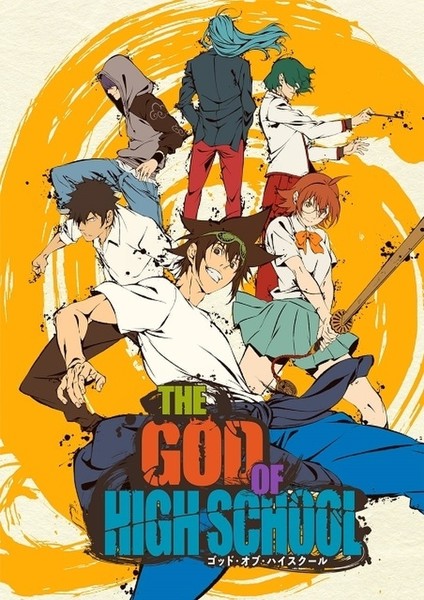
That's a word you can apply to The God of High School, too. So fun that it has a mobile game to its credit, along with the manhwa, anime, and a novel or two, although in this case, the manhwa came first. It's also the most manageable length of the books to get adapted so far, clocking in at only four collected volumes, which are being released in English by Wattpad. (And you can read the whole thing on Line Webtoon if you prefer.)
The story is one of those goofy “only in pop fiction” tales – Jin Mori is a seventeen-year-old martial artist who is invited to join the tournament from which this series takes its title, with the prize being the not-at-all-suspicious granting of any wish by the tournament sponsors. The series is structured like one of those increasingly ridiculous shounen tournament arcs, with insane skills, weird competitors, and, of course, something just a little bit off about the whole thing. Although it draws on the idea of three realms – human, demon, and godly – it's more interested in the fighting than the mythology, which feels fair. There are cults, secret trips to the Pentagon, the Monkey King from Journey to the West, and increasingly convoluted reasoning and powers. If you're looking for something that makes sense, this isn't the place to be, but if tournaments are your favorite part of shōnen manga, this is a dream come true. Like A Returner's Magic Should Be Special, this is utterly unashamed of what it is, and that goes a long way to making it work.
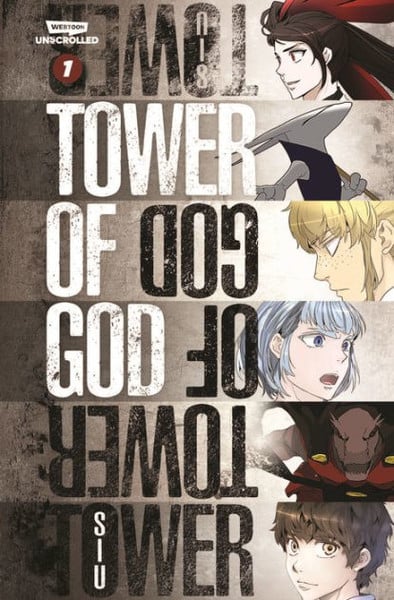
Tower of God, which, like Solo Leveling, is getting a second season, is probably the most interesting of the recent batch. Based on a webtoon that can be read either on Line Webtoon or in physical editions from Wattpad's Webtoon Unscrolled, the story feels unique.
Set in the eponymous tower, it follows Bam as he attempts to fight his way to the top, with his goal being to find a way to see his friend Rachel again. Rachel and Bam grew up beneath the tower, and he'll do anything to be reunited with her, even if it means dying – because it is possible that that may be the only way to see her. Taking cues from Lewis Carroll's Alice duology, the story inverts Carroll's rabbit hole, as if Bam is starting in Wonderland and has to climb out of it into our world and the various allies and enemies he meets along the way contribute to that feel.
There are a lot of characters, which can be a barrier to entry, but Tower of God is committed to telling its story in the way it wants to, and while there are familiar beats to be hit, it doesn't feel quite as cookie cutter as it could. If Solo Leveling and Doctor Elise take the familiar and tweak it a little, Tower of God tries to take the familiar and remake it in its own image. Does it work? Not all the time, but it's still an interesting exercise, and with thirteen volumes currently and the manhwa still in serialization, there's more than enough material for that upcoming second season.
We should applaud anime finding sources of inspiration outside its usual stomping grounds. Seeking out K-Comics, manhua, comics, BDs, or anything else helps to add to the variety of what we get animated, or even just a slightly different take on the familiar. And there are plenty more good manhwa that could use an anime adaptation – personally, I'd love to see Villains are Destined to Die or My Gently Raised Beast on the screen. And that's not even getting into the manhwa to receive a live-action series! If you aren't reading manhwa, any of the titles already adapted are a good place to start, and who knows? The next title you get into may turn into an anime series somewhere down the line.
Where to Read:
Solo Leveling: Tappytoon
The Reason Why Raeliana Ended Up at the Duke's Mansion: Tappytoon
Doctor Elise: Tapas, Lezhin
Noblesse: Webtoon
Viral Hit: Webtoon
A Returner's Magic Should Be Special: Tappytoon
The God of High School: Webtoon
The Tower of God: Webtoon
Disclosure: Kadokawa World Entertainment (KWE), a wholly owned subsidiary of Kadokawa Corporation, is the majority owner of Anime News Network, LLC. Yen Press, BookWalker Global, and J-Novel Club are subsidiaries of KWE.
discuss this in the forum (10 posts) |